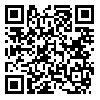Volume 15, Issue 4 (3-2023)
ijhe 2023, 15(4): 725-736 |
Back to browse issues page
Download citation:
BibTeX | RIS | EndNote | Medlars | ProCite | Reference Manager | RefWorks
Send citation to:



BibTeX | RIS | EndNote | Medlars | ProCite | Reference Manager | RefWorks
Send citation to:
Bodaghi M, Rasolevandi T, Mahvi A H, Azarpira H. Environmental health status of Saveh kindergartens during the Covid-19 pandemic in 2020. ijhe 2023; 15 (4) :725-736
URL: http://ijhe.tums.ac.ir/article-1-6733-en.html
URL: http://ijhe.tums.ac.ir/article-1-6733-en.html
1- Student Research Committee, Saveh University of Medical Sciences, Saveh, Iran
2- Department of Environmental Health Engineering, School of Public Health, Tehran University of Medical Sciences, Tehran, Iran
3- Department of Environmental Health Engineering, School of Public Health, Tehran University of Medical Sciences, Tehran, Iran AND Center for Solid Waste Research (CSWR), Institute for Environmental Research, Tehran University of Medical Sciences, Tehran, Iran
4- Department of Environmental Health Engineering, Saveh University of Medical Sciences, Saveh, Iran ,hazarpira912@gmail.com
2- Department of Environmental Health Engineering, School of Public Health, Tehran University of Medical Sciences, Tehran, Iran
3- Department of Environmental Health Engineering, School of Public Health, Tehran University of Medical Sciences, Tehran, Iran AND Center for Solid Waste Research (CSWR), Institute for Environmental Research, Tehran University of Medical Sciences, Tehran, Iran
4- Department of Environmental Health Engineering, Saveh University of Medical Sciences, Saveh, Iran ,
Abstract: (981 Views)
Background and Objective: Due to the presence of infectious diseases and parasitic contamination in kindergartens, it is very important to observe the health points in these centers. This cross-sectional analytical study was conducted to investigate the environmental health status of Saveh kindergartens in 2020.
Materials and Methods: A checklist with 133 questions was designed, including 57 questions specific to the conditions of the coronavirus, taken from the instructions for the second step of the fight against the coronavirus and 76 questions from regulation 150/920318. All active kindergartens (9 cases) in the study were included, and the answers to the questions as yes, no, and not applicable were recorded and using SPSS software, independent T, chi-square, and one-way ANOVA was analyzed.
Results: The results obtained from the analysis of the checklist showed that the compliance of the health status of all kinds of kindergartens with the regulations of 150/920318 has a percentage of total desirability that includes personal hygiene (81/4%), food hygiene (63%), tools and equipment hygiene (66/5%), building hygiene (78%), health education (90%), considerations regarding disinfectants and disinfectants based on alcohol (92%) and considerations regarding bleaches (94%). There was no significant relationship between the per capita of each child and the different items on the checklist (p>0/05).
Conclusion: This study showed that the general environmental health status of kindergartens in Saveh was favorable and only two variables of hygiene of tools and equipment (66/5%) and food hygiene (63%) were the least desirable among the studied factors that should be considered.
Materials and Methods: A checklist with 133 questions was designed, including 57 questions specific to the conditions of the coronavirus, taken from the instructions for the second step of the fight against the coronavirus and 76 questions from regulation 150/920318. All active kindergartens (9 cases) in the study were included, and the answers to the questions as yes, no, and not applicable were recorded and using SPSS software, independent T, chi-square, and one-way ANOVA was analyzed.
Results: The results obtained from the analysis of the checklist showed that the compliance of the health status of all kinds of kindergartens with the regulations of 150/920318 has a percentage of total desirability that includes personal hygiene (81/4%), food hygiene (63%), tools and equipment hygiene (66/5%), building hygiene (78%), health education (90%), considerations regarding disinfectants and disinfectants based on alcohol (92%) and considerations regarding bleaches (94%). There was no significant relationship between the per capita of each child and the different items on the checklist (p>0/05).
Conclusion: This study showed that the general environmental health status of kindergartens in Saveh was favorable and only two variables of hygiene of tools and equipment (66/5%) and food hygiene (63%) were the least desirable among the studied factors that should be considered.
Type of Study: Research |
Subject:
General
Received: 2022/12/10 | Accepted: 2023/03/11 | Published: 2023/03/15
Received: 2022/12/10 | Accepted: 2023/03/11 | Published: 2023/03/15
Send email to the article author
| Rights and Permissions | |
 |
This work is licensed under a Creative Commons Attribution-NonCommercial 4.0 International License. |






